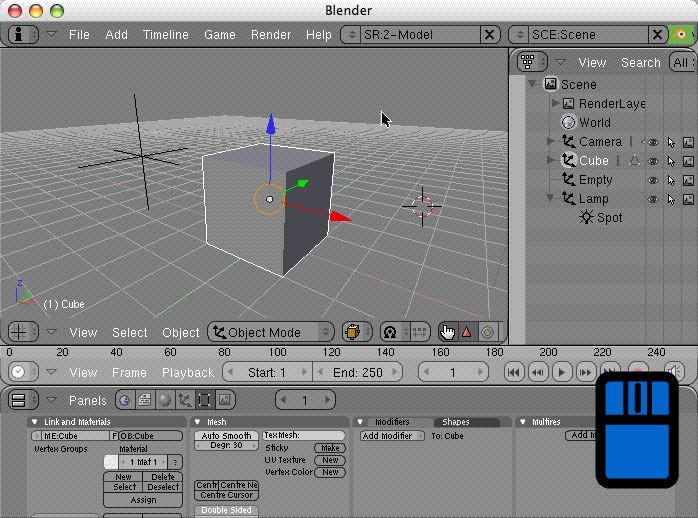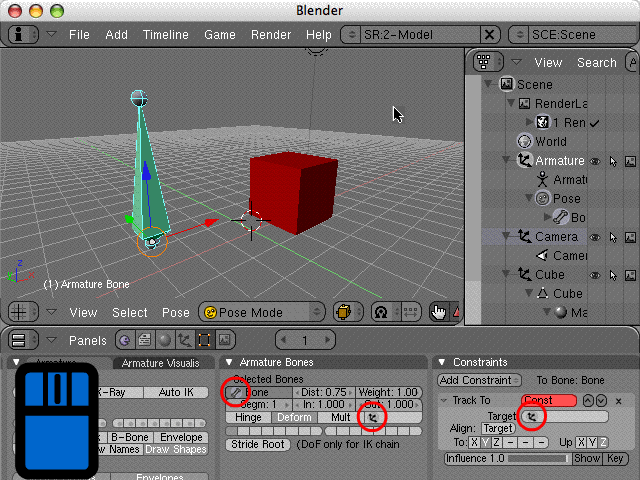Dev:Source/Development/Proposals/Outliner
Taken for the moment integraly from User:Kattkieru
The new Outliner code in 2.43 is an incredible step forward in usefulness for this tool. (Particularly interesting are the selectable / renderable / visible flags -- I hope these have a Python API.)
In looking at Cinema 4D especially (recently many of my friends have switched to it), I think that some of the usability features in C4D's own Object Manager could be... "stolen," as it were.
Here's a list of my ideas:
- The current selection system is somewhat counter-intuitive. "Select by clicking anywhere but the name and icon" -- why? The icon is the likely place any user will click and attempt to drag, and as such it should be the main recipient of click events.
- Clicking the icon should select the object and highlight the row (as rows are highlighted currently by clicking not on the icon or name). Shift-clicking on the icon should be used to deselect or to add to the current selection. This is more consistent with other apps.
- In addition, modifiers, textures, materials, and mesh data should also receive highlighting like this. There is a good reason for this which I will detail later, but it's also just a user interface issue: if you can select objects at the object level and have them highlighted, you should also be able to do the same at the texture or constraint level so that the experience is consistent within the Outliner.
- Drag and drop parenting from within the Outliner. Left-mouse click and drag (possibly with a 100ms hold before dragging, to distinguish drag operations from click operations) on an icon picks up the icon and name, attaching it to the mouse pointer. As parenting operations can be cumbersome, a specific system of drop points will be established:
- Dropping the icon to the left of all icons will unparent child items. (Dropping items without a parent to the left of all icons would do nothing, essentially leaving them where they are.)
- Dropping the icon beneath the icon or name of another Object (not material, constraint, texture, etc.) would parent the dropped item to the recipient. A line would appear beneath the icon and name of the recipient object to indicate that a parenting operation will occur on mouse button release.
- Dropping the icon above the icon or name of another child Object would parent the dropped object to the recipient child object's parent, at the same level as the recipient child object. This is a particularly problematic operation in a lot of software, so it's important to get it right.
- Certain items like Materials cannot be unparented, but could be applied to other objects by holding Alt and then dropping. With the Alt key held a Plus symbol could appear next to the mouse cursor (yes, just like on the Mac OS), indicating that the data is about to be duplicated. Since Blender has a substantial linking system some thought would need to be put into how this duplication will occur -- through linking or through a full copy. My recommendation is that a full copy is used when only the Alt key is held down, but if Alt+Shift are held down before dropping, then a link is created. It would be important to have this be the same across all object and data types for consistency in the UI. People would get the hang of it, and tutorials would pop up quickly enough noting that most of the time you want to hold Alt+Shift when dropping materials, but only Alt when attempting to duplicate an object, for example.
- Similar to the Material copying, Objects could be duplicated and linked with a combination of the left mouse button and Alt/Shift.
In addition, I'd like to reiterate my suggestion (which was posted somewhere else on the wiki) of a filtering system for the Outliner based on user searches. Similar to iTunes, a search bar should be added through which the user can have the Outliner show only the items matching the (case insensitive?) search string. THIS SHOULD NOT BE A LIVE SEARCH. Live searching is unforgivably slow on older machines, and many Blender users are on older hardware. It should instead work as follows:
- User hits Control+F (Find) or selects it from a drop-down menu.
- User types in the search string, hits enter.
- The Outliner display is updated with only objects that match the search string (and possibly their parents).
This could be further filtered by adding data type filtering to the Outliner menu.
In its current state the Outliner right-click menu is, in my opinion, not what users are going to expect. (To be honest, when I first right-clicked and saw Select / Deselect / Unlink / Make Local, I found it both redundant and not useful at all.) I think firstly that Select / Deselect can be removed and replaced with the selection method I detailed above. Furthermore, the menu could be made more useful by giving textual versions of the left mouse click-and-drag functionality:
- Menu could be as follows: Rename, Copy, Copy as Instance, Copy Name, Delete, Unparent.
- Under the three Copy selections, there would also be Paste, Paste as Instance, and Paste Name. These would be greyed out (not available for selection), or not present at all, unless an object or name had been copied previously.
For pasting, the user would right-click again on another object:
- If an object was copied as duplicate (Copy) or as an instance (Copy as Instance), then the menu would be the same as before adding the Paste selections under the copy set.
- In terms of parenting, you could also have Paste as Child and Paste as Sibling. Paste as child would paste the object or instance as a child of the clicked object. Paste as Sibling would only be available on object that are children of other objects, and would be like left click and drop above an object (detailed above).
Another idea that could be worked in here would be for PyDrivers. In the right-click menu, there could also be a "Copy as Driver" submenu.
- At the Object level, this would open a submenu of nine items -- Location, Rotation, and Scale along all three axes. (How would quats work here? I have no idea, but they're not as useful from a user perspective as they require math that can't be done mentally. At least, that's my opinion.) Selecting one of these would copy, to the global Blender clipboard, the python driver string for what you selected.
- For example: I have two cubes, Cube1 and Cube2. I want Cube1's X rotation to drive Cube2's Z rotation. I right-click Cube1 in the Outliner, select Copy as PyDriver->X Rotation. This copies the string, "ob(Cube2).RotX" to the global clipboard. Then the user can go to the IPO window, add a driver, press the Python button, and paste the copied driver.
I would personally like the ability to right-click and paste on text buttons, but that might be asking for too much. ^_^
Outliner and Button Interaction
Part of the left click and drag functionality that would be infinitely useful AND fix a long-standing annoyance in Blender would be the ability to drag from the Outliner into the Buttons window. This is going to be a two-part recommendation.
- Currently there are a lot of buttons that start with short text signifiers that indicate what kind of object or data name they expect to receive. For example, in the Material Buttons, under Links and Pipeline->Link to Object, there's a box that says "MA: Material" and "ME:Cube1" on the screen I currently have open. The first suggestion is to do a Blender-wide replacement of those buttons with a new button type: icon button. The icons would match the icons present in the Outliner, unifying the UI and letting the user know, visually, which data types go where.
- Dragging an object from the Outliner to the buttons window, onto an icon button, would replace the text with the name of the dropped object. So for example, if I wanted to replace "MA:Material" with "MA:Redball," I could drag Redball from the Outliner onto "MA:Material" and release; the material on the object would be changed to Redball. The same could be done for groups, mesh object, and Object or Bones inside Constraints and Modifiers.
This is such an important workflow improvement that, regardless of all other suggestions above, I think this should definitely make it into Blender 2.5. It provides a serious improvement in workflow for all users, and particularly improves the workflow in scenes with hundreds of objects. No more typing names, or selecting an object to copy its name for pasting!
One note would be on multiple object selection. The dragging of multiple objects outside the Outliner should not be allowed in most instances (although dragging from the Outliner into an Object Nodes window would be nice -- more on that later). Multiple material dragging should only be allowed onto Node windows. Also, for consistency's sake, the last selected item (the active item in current Blender terminology) should be the only name displayed in the drag item beneath the mouse cursor. To indicate that multiple objects are selected, a number not unlike the number used to indicate the current frame during rendering could also appear next to the mouse cursor, showing the number of items being dragged. It's possible that only Objects should allow multiple dragging, as doing so with Data opens up a can of worms with regards to workflow that I can't see any way around. Also, multiple data selection doesn't strike me as "as useful" as multiple Object-level selection, save perhaps when it comes to deletion.
Outliner Layers
I don't know if the selectable / visible / renderable flags in the Outliner can be set for multiple objects at once through some key combination, but I think that Groups should be special with regards to this.
Groups could serve as named layers in the Outliner, allowing users to template or turn off the renderability for all objects within. I know that some developers have done work with named layers in the past, and I think that this suggestion would satisfy the needs of most users.

